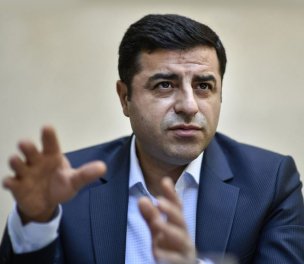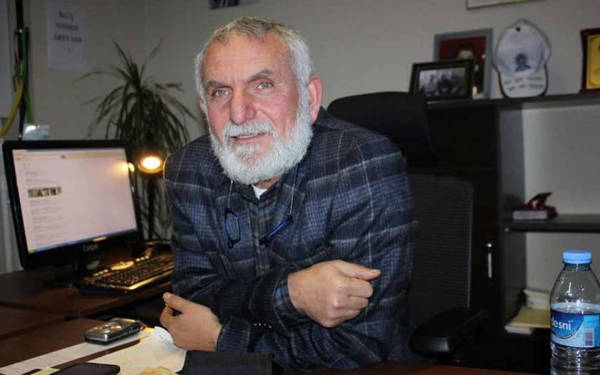Click to read the article in Turkish
The European Court of Human Rights (ECtHR) Grand Chamber ruled on December 22 that Kurdish politician Selahattin Demirtaş should be immediately released from prison.
Senior government officials from Turkey, including President and Justice and Development Party (AKP) Chair Recep Tayyip Erdoğan, quickly dismissed the ruling, implying that it was not binding.
The European court "can't replace our courts," said Erdoğan while Minister of Interior süleyman Soylu asserted that the verdict was "in vain" and meaningless."
The Ankara 7th Penal Court of Peace refused a request for Demirtaş's release on Saturday (December 26), on the grounds that it hadn't received the Turkish translation of the judgment.
The attorneys of the politician are now expected to make another application with a translation.
Demirtaş, a former co-chair of the Peoples' Democratic Party (HDP), has been behind bars for "terrorism" charges since November 2016.
We have spoken with one of his attorneys, Benan Bolu, about why Turkey has to implement the ECtHR decision and what will happen otherwise.
Why does Turkey have to comply with ECtHR decisions?
ECtHR decisions are binding. Turkey is a party to the European Convention on Human Rights. To be a party to the convention, it accepts the authority of the Council of Europe and the Human Rights Court and promises to comply with the decisions of the administration.
Also, these decisions are binding according to the last paragraph of article 90 of the Constitution. This paragraph says international conventions will take priority in terms of fundamental rights and freedoms.
According to article 46 of the ECHR titled "binding force and execution of judgments," this decision given by the Grand Chamber on December 22 has become final and binding for all institutions, everyone as of 5 p.m. when it was published on the ECtHR website.
So, Turkey does not have a chance to say, "I'm not implementing this." The decision is binding because Turkey is a party to this convention and it absolutely has to implement it. It's not a subject open for discussion.
Who will check whether the decision is implemented or not?
Not implementing the ruling means acting against the convention and the commitment to the court's authority.
After the decision, this incident is out of the ECtHR's realm. It is the Council of Europe Committee of Ministers that checks whether the ECtHR decisions are implemented or not. The ball is in the Committee of Ministers' court now.
How will the process continue?
We will notify the Committee of Ministers about the statements made [by the government] after the decision. Apart from that, the Committee of Ministers will also request an opinion from Turkey. It will ask Turkey, 'What have you done?', ' Why has Grand Chamber judgment not been implemented until this time?'
If it isn't convinced, the opinion process will continue for a very long time.
Will there be sanctions if the release decision is not implemented?
Of course. We have an example from Azerbaijan, the Ilgar Mammadov case. According to paragraph 4 of article 46 of the ECHR, if a state insists on not fulfilling final and binding decisions given by the Court of Human Rights, the Committee of Ministers starts the procedure of complaint with a two-thirds majority vote.
This was implemented against Azerbaijan before. For the first time in the history of the Council of Europe, it was decided to impose sanctions on a state. A complaint was filed against Azerbaijan to the ECtHR for not fulfilling the decision and consequently, Azerbaijan had to release and acquit the person concerned and paid compensation to him.
Because the process can bring a series of sanctions from blocking licenses to not being able to be a candidate in Council of Europe elections and being removed from the Council of Europe.
Azerbaijan couldn't resist anymore and released and acquitted Mammadov. As a result, the possibility of sanctions was removed.
Do the same things apply to Turkey as well?
Yes. The same sanctions and process will apply to Turkey if Selahattin Demirtaş is not released.
When the first ECtHR decision for Demirtaş was not implemented and Demirtaş was arrested again in 2018, the Council of Europe had warned Turkey that it might go this way. We also see that the ECtHR decision for Osman Kavala has not been implemented since then.
If both Kavala and Demirtaş are not released despite these decisions, Turkey will face sanctions.
Is releasing Demirtaş enough according to the ECtHR decision?
According to the ruling, Demirtaş should not only be released but also be acquitted. Moreover, this ruling would be binding even if it was against Demirtaş. As his attorneys, we would say the same thing. We would say, 'This decision is binding, there is nothing to do.' This applies to everyone, no matter [the decision is] positive or negative. It is very clear that the decision is binding in accordance with both the ECHR or other international conventions and the Constitution.
And now we say that the release of Demirtaş is not enough, he should also be acquitted according to the ECtHR decision. And they will have to acquit him in the end anyway. (HA/VK)




















